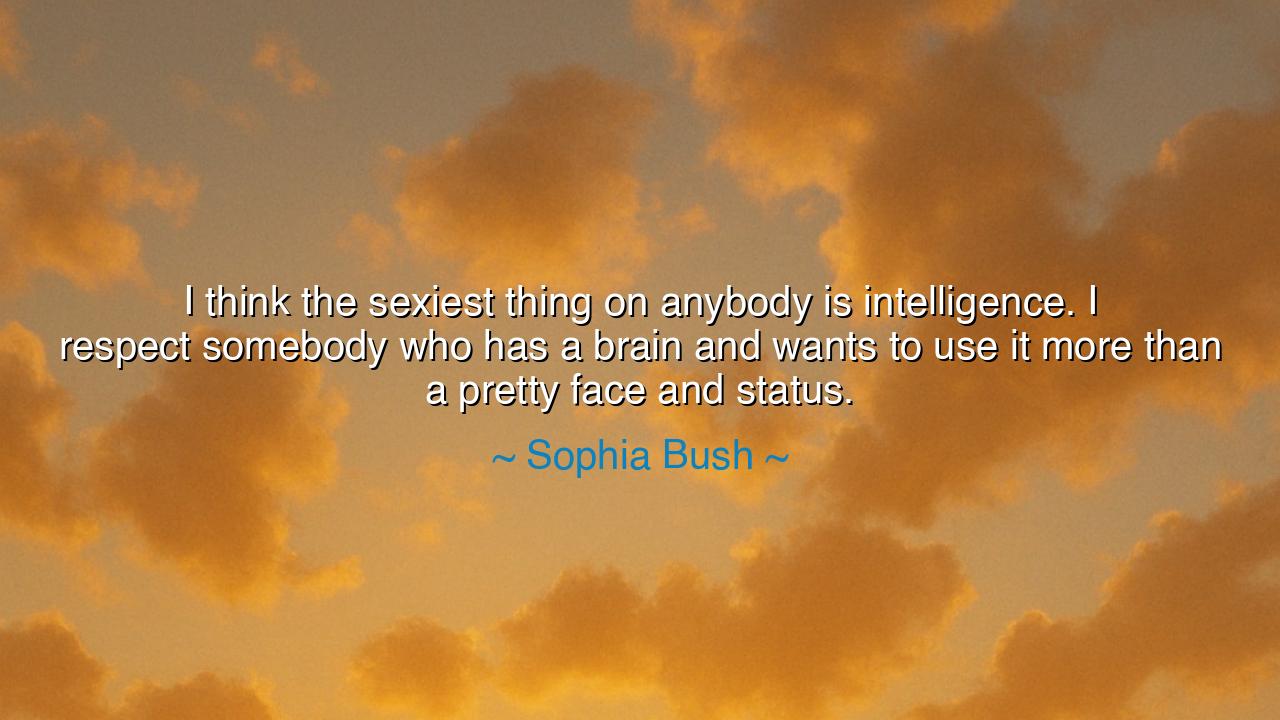
I think the sexiest thing on anybody is intelligence. I respect
I think the sexiest thing on anybody is intelligence. I respect somebody who has a brain and wants to use it more than a pretty face and status.






The words of Sophia Bush, radiant in their sincerity, pierce through the shallow illusions of the modern age: “I think the sexiest thing on anybody is intelligence. I respect somebody who has a brain and wants to use it more than a pretty face and status.” In these words lies not mere sentiment, but a cry for depth in a world obsessed with surface. Bush speaks to the heart of human value — that true beauty shines not from the skin, but from the mind and spirit within. To her, intelligence is not only alluring; it is noble, magnetic, and eternal. For faces fade, and wealth crumbles, but the mind — alive, curious, and courageous — remains a light that time cannot dim.
Sophia Bush, known for her grace both on screen and in life, is no stranger to the illusions of fame. Surrounded by a culture that prizes glamour and status, she saw clearly what many forget: that the truest measure of a person lies not in what they wear or possess, but in how they think, question, and care. Her words echo the wisdom of the ancients, who long before our age of vanity understood that beauty without virtue and intellect is a hollow vessel. The Greeks called this harmony of mind and body kalokagathia — the union of the beautiful and the good. To them, the human being reached greatness only when outward grace was matched by inner excellence. Bush, in her modern voice, revives this ancient truth: that intelligence — the capacity to reason, to empathize, to create — is the soul’s adornment, the crown of all other virtues.
Her words remind us, too, of the eternal story of Aspasia of Miletus, the companion and muse of Pericles, the great leader of Athens. Though not of noble birth, Aspasia was renowned for her wisdom and eloquence, so much so that even Socrates himself sought her counsel. Men came not merely to gaze upon her beauty, but to hear her thoughts, to be challenged by her questions, to feel the fire of her intellect. In a world that often sought to silence women, Aspasia’s mind commanded reverence. Like Sophia Bush, she taught by her example that intelligence is the truest form of power — and the most enduring form of attraction. For when the mind shines, it illuminates everything it touches, turning conversation into art and connection into revelation.
There is also, in Bush’s reflection, a quiet rebellion — a resistance against the idolatry of appearance that so often rules both ancient courts and modern screens. She rejects the false gods of beauty and status, knowing that these idols demand endless sacrifice and never give peace in return. The ancients warned of this, too. The philosopher Diogenes, when asked what was most beautiful in a person, replied, “The flame of their mind.” He lived in poverty, yet possessed a freedom that no wealthy man could buy. His beauty was of the spirit — untamed, luminous, and fearless. Bush’s words carry that same defiance: that true allure lies not in conforming to the world’s gaze, but in being authentic, thoughtful, and alive.
Yet her insight is not only moral but romantic, for it speaks of the deepest yearning in the human heart — to be understood. When Bush says she respects those who “have a brain and want to use it,” she speaks of a love that transcends flesh, a connection that binds souls through thought and shared curiosity. The passion born of intellect is the purest kind, for it is love rooted in admiration rather than possession. The ancients knew this, too; Plato, in his Symposium, taught that the highest form of love was the love of the mind — the ascent from physical desire to the contemplation of truth and beauty itself. To fall in love with intelligence is to fall in love with eternity.
Bush’s declaration is also a call to self-respect. She teaches that to be truly “sexy” is not to seek admiration through the eyes of others, but to cultivate the mind, to live curiously, to think deeply, and to speak with purpose. In doing so, one becomes radiant — not by ornament, but by essence. This wisdom belongs to all who strive to rise above the noise of vanity and seek the serenity of authenticity. The person who reads, who listens, who questions, who learns — such a person glows with a beauty that no mirror can capture. For knowledge transforms not only the intellect but the posture of the soul, imbuing one with confidence, clarity, and grace.
Thus, the lesson of Sophia Bush’s words is timeless: cherish and cultivate your intelligence, and you will never lose your beauty. Do not chase admiration through shallow displays, but through the strength of your mind and the purity of your spirit. Engage with ideas; nurture curiosity as you would love. Seek those who challenge you to think, who ignite conversation rather than competition. For relationships built upon mind and meaning endure where vanity fades.
So, dear listener, remember this truth — that the most captivating thing you can wear is not your skin, but your mind. Polish it as others polish jewels; let your words and thoughts be your adornment. The ancients revered wisdom as divine, for it made humans akin to the gods. In our time, too, it is intelligence — luminous, kind, and alive — that reveals the truest form of beauty. Be not only seen, but understood; be not only admired, but remembered. For while faces fade into the twilight of time, the brilliance of the mind shines forever.






AAdministratorAdministrator
Welcome, honored guests. Please leave a comment, we will respond soon